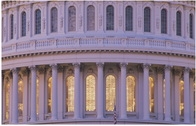Advertisement
NAHB Calls on Congress for Income Verification System

As Congress debates comprehensive immigration reform, the National Association of Home Builders (NAHB) called on lawmakers to establish a fair and workable verification system for all businesses. Participating in a congressional roundtable discussion on the impact of the mandatory E-Verify electronic employment verification system on America's small businesses, NAHB Chairman Rick Judson said that such a system must "be fair and efficient, and not impose significant burdens on employers." The roundtable was held by the Senate Committee on Small Business and Entrepreneurship.
"Congress must also be mindful of the home building industry and its intricate system of general contractors and subcontractors for the system to be workable," said Judson, a home builder and developer from Charlotte, N.C.
As Congress moves to advance immigration bills pending in the House and Senate, NAHB said that a fair and workable E-Verify system for all U.S. employers should:
►Maintain current law, holding U.S. employers accountable only for verifying the identity and work authorization status of their direct employees. Congress should not require employers to verify someone else's workers, such as a subcontractor's employees, as this is both unfair and infeasible.
►Maintain present law that forbids employers from knowingly hiring undocumented workers, including subcontracted workers. NAHB fully supports maintaining this "knowing" standard to ensure employers understand their role and obligations under the law.
►Ensure that any compulsory federal E-Verify program contains a robust safe harbor for employers so that those who use the system in good faith cannot be held liable for errors in the E-Verify system by any federal agency, including the U.S. Department of Homeland Security, or by the employer's workers.
►Include a strong pre-emption clause preventing state and local governments from creating their own versions of verification requirements for employers. If employers are going to be required to use the federal E-Verify program, they must be assured that they will not also have to meet other potentially conflicting compliance standards imposed by state and local governments.
►Allow employers to begin the E-Verify process when a worker accepts a position, rather than be required to wait until after the start date. This will provide businesses more lead time to handle tentative non-confirmations for those who are ineligible to work.
►Allow employers to access the E-Verify system via telephone and the Internet so it is more workable for small employers.
In addition to calling for a fair and efficient nationwide E-Verify program, Judson said that NAHB supports comprehensive immigration reform that would protect the nation's borders and create an efficient temporary guest worker program that allows employers to recruit legal immigrant workers when there is a shortage of domestic workers.
About the author





